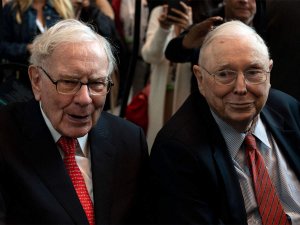Charlie Munger: “No one should believe Robinhood trades are free”
“It’s most egregious in the momentum trading by novice investors lured in by new types of brokerage operation like Robinhood and I think all of this activity is regrettable.”

Charlie Munger, vice chairman of Berkshire Hathaway, called Robinhood’s business model a “dirty way of making money” at the Los Angeles-based Daily Journal annual shareholders meeting.
The longtime business partner of Warren Buffett compared the current stock trading mania to the South Sea bubble of 1720 and partially blamed brokers using the payment for order flow model (PFOF) for luring amateur investors with free trading services.
“It’s most egregious in the momentum trading by novice investors lured in by new types of brokerage operation like Robinhood and I think all of this activity is regrettable”, said the 97-year-old investor.
“No one should believe Robinhood trades are free […] The frenzy is fed by people who are getting commissions and other revenues out of this new bunch of gamblers”, Mr. Munger added. “There are threats of clearinghouse failure, so it gets very dangerous. And it’s really stupid to have a culture that encourages as much gambling in stocks by people who have the mindset of racetrack betters […] It’s a dirty way of making money.”
Mr. Munger continued his rant at the annual shareholders’ meeting. “You will remember when the first bubble came which was the South Sea bubble in England back in the 1700s. It created such big havoc when it blew up […] England didn’t allow hardly any public trading in securities and any companies for decades thereafter. It just created the most unholy mess.”
“So the human greed and the aggression of the brokerage community creates these bubbles from time to time. I think wise people just stay out of them”, Mr. Munger stated.
The lack of transparency and conflict of interest in the payment for order flow model (PFOF) are some of the issues pointed by critics who demand a ban on the business model. But the trading disruptions experienced during the GameStop short squeeze were mainly due to infrastructure design which is not prepared for such volatility.
In the United States, the two day settlement cycle has been blamed as the culprit by a significant number of high-profile names within the industry, headed by nearly disgraced US-based neo broker Robinhood. These industry participants, mostly pro-PFOF, have called for a shorter settlement cycle for U.S. equities: one business day after the trade is executed (T+1).
DTCC has recently released a paper highlighting the benefits of moving to a T+1 settlement cycle, including cost savings, reduced market risk, and lower margin requirements. The firm called for such a move, which is most beneficial during times of high volatility and stressed markets. DTCC estimates that a move to T+1 could bring a 41% reduction in the volatility component of NSCC’s margin.









